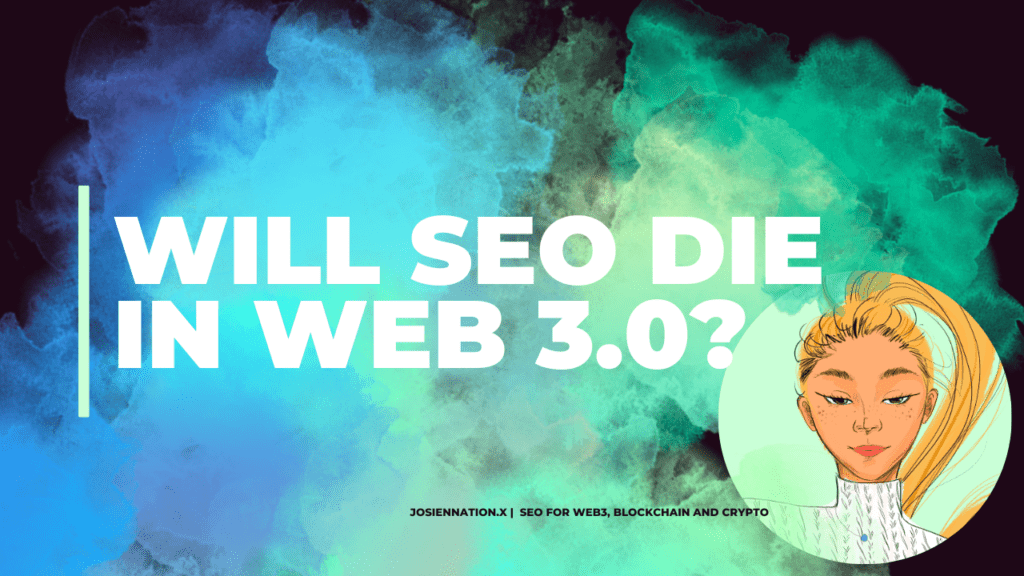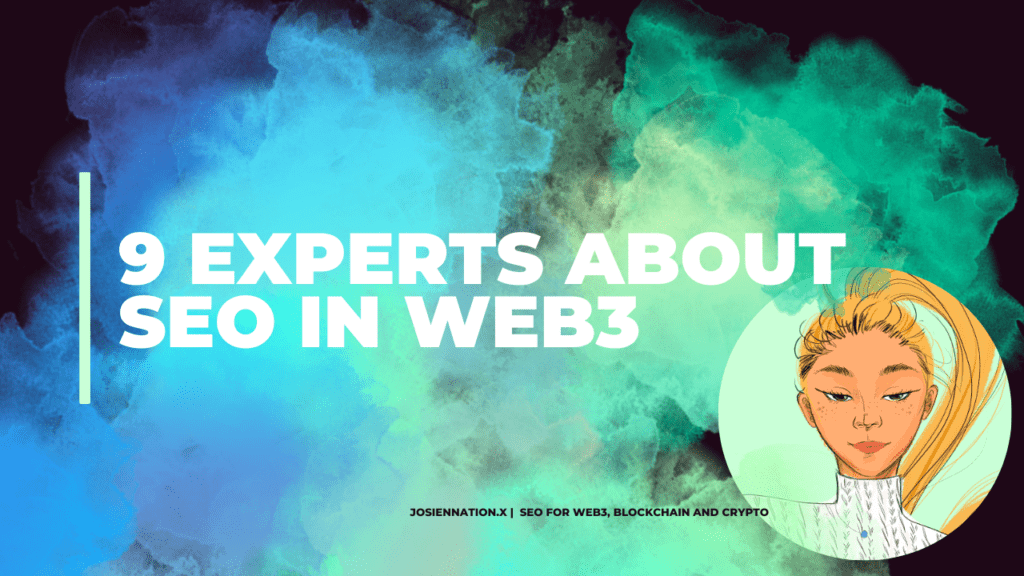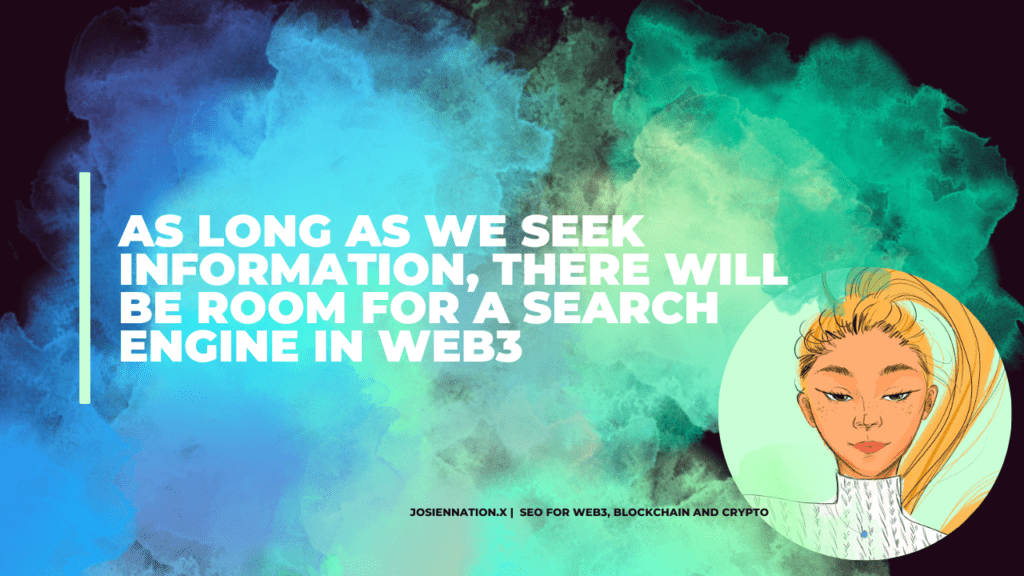The first time Web3 came onto my radar was about a year ago, in the summer of 2021. I already had some knowledge of crypto, but it was fairly limited. Even so, that was enough to get me interested when a close friend of mine, Kyle Readheid (co-founder of W3Academy) introduced me to Web3, which allows users to control their own data. Compared to information-gathering giants like Google and Facebook, that’s a pretty novel concept! Rather than automatically sharing huge amounts of personal data every time you’re online, Web3 lets you decide who your data is shared with (if you want to share it at all).
Web3 is still being developed, but experts agree that it’s the future of the internet and of data security. When I first started learning about it, my biggest question was how it would affect SEO. After all, I’m an SEO Consultant, and I’d just learned about something that could potentially turn my job upside-down. The Google algorithm depends on user data to function, but what if the algorithm can’t decide what it reads and what it works with?
Everything I was initially hearing about Web3 made it sound like the future of SEO was hanging in the balance. Would Web3 be the end of SEO – and would I need to develop a new specialty? My head was spinning and my wheels were turning; I immediately started digging deeper into the possibilities.

I had all kinds of questions at first. Not only did I want to learn more about Web3 itself, but I also needed to figure out how it would affect the way we use search engines. Would Web3 even have a search engine? Could Google become obsolete once Web3 becomes more widely used?
Now that it’s been about a year since I started looking into Web3, I can say that I’ve learned a lot – and I’m excited about what I’ve learned! I’m even working as an SEO Specialist for Web3 and blockchain companies.
My head isn’t spinning anymore, but my wheels are definitely still turning. Remember when the internet was in its infancy, and everyone was amazed that you could connect a computer to it and read a transcript that was sent from the other side of the world? That’s where we are with Web3; it’s the internet in the 80s. The UX is often clumsy, it’s sometimes expensive, and it can be time-consuming to use. But just like with the early internet, Web3 is full of potential.
Here’s something else to think about: the earliest version of the internet didn’t have Google or any search engine for that matter. We should be asking if Web3 will use Google, but we also have to consider the possibility of a new search engine.
Take a look at Presearch for example. You can already use their decentralized search engine and per search query, you can earn their token $PRE. When you buy or earn the tokens, you can stake keywords (aka advertise). Pretty exciting, but how would SEO work in such a search engine?
So, even though Web3 is still in the beginning stages, it’s already making waves. Could we see the same thing happen with a search engine?
Must read: Why you need SEO in web3

This change has significantly influenced my career, and I wanted to unlock the mystery surrounding it. To do this, I asked other SEO specialists and Web3 DOers what they thought about SEO in Web3. Will SEO die, or will it keep going? Will it have to adapt in order to survive? Here are their answers.
“SEO will maintain its relevance and importance when Web3 is the new internet simply because search engines will still exist. At this point, search engines are not being replaced– and for good reason. Search engines play an essential role in user experience and success, which SEO is inherently tied to, as well. As long as there is internet– or, Web3 –users, they’re going to need and want search engines. Remember, it’s about both verification and validation. Web3 has to fulfill user needs, too.
I believe the methods of implementation and utilization will likely shift due to evolving technologies and tools. However, the primary goal of SEO will still be present due to user needs and the overall user experience. I certainly expect other search engines to emerge as opportunity gaps are observed and identified. New search engines will likely highlight the use of new features and potential associated with Web3. Whether or not they will become popular or commonplace is another story. We’ve all seen the other search engines that compete with Google, but do any of us really use them? These other search engines have been around for years, but, more often than not, we all turn to Google.
So for those wondering what will happen to search engines and SEO when Web3 is globally accepted, ask yourself this: was your first thought to Google that?”
“Although SEO itself will definitely remain important as we transition to Web3, its form may change dramatically, meaning that marketing professionals will need to stay vigilant and up to date as details emerge. We do not know exactly what tomorrow’s search engines will look like, but there are a number of presently existing technologies and platforms that offer a glimpse of what we can expect.
Some sources believe that Web3 will build on the voice-activated technology that drives popular virtual assistants like Siri and Alexa. If this is the case, marketers should remember that these kinds of searches tend to be longer than text-based ones, meaning that they might want to look into developing longer SEO terms. Moreover, blockchain-based searching will make use of semantic HTML coding that allows users to further personalize their searching experience, meaning that SEO professionals will need to work to refine their keyword creation and link-building techniques in ways that make it easier for their desired clientele to come across them.
Finally, it’s important to pay attention to companies currently breaking into the Blockchain-based search engine space, both to see what they are currently doing and imagine what they may try to do in the future. For example, decentralized search engine Presearch is experimenting with a search engine system based on a network of nodes powered by community operators. In this system, operators are being rewarded with cryptocurrency for every successful query they process, while advertisers are able to use crypto tokens to buy a stake in a given search term, making it more likely that their ads will be displayed in any searches that use the term. This is just one possible monetization model that marketers concerned with transitioning to Web3 should consider strategizing for.”

“When it comes to Web3, I don’t believe that SEO will be impacted much – if even at all. The thing about Web3 is, while it will be safer and more convenient in a lot of ways, there is still going to be a need for search engines and people will still want to have a good experience when using those search engines.
SEO makes the user experience better. It ensures that the right content is popping up in front of us when we search something instead of having to search for hours through irrelevant content. Since there are still going to be search engines when Web3 is the most common form of the internet, there is still going to be a need for SEO if we want relevant content to appear.
I think that the only way that we will see SEO disappearing from existence is when a new way to search for things comes into existence – and I don’t see that happening anytime soon. Even if you search via voice technology, SEO still comes into play because it helps those platforms search databases and reveal desired options.
Web3 is going to be more transparent. It’s not going to completely change the way we find stuff online. And I think that’s where the answer to whether or not SEO will be relevant lies.”
“I’m incredibly excited for what web3 promises. Will it have a profound impact on the way we search for information? It could but no one can say with any certainty. The convenience of Google is something that I simply can’t see being replicated for some time yet. In fact, I can’t see any change to the way that we search in the next decade. At least not a change to search involving web3.
The underlying technology of web3 is still being built. You only have to look to DeFi, knowing that’s where the money is and the whole experience there is still clunky and super-stressful for new users.
However, we can see a few glimpses of how web3 may play a role. All that data that Google stores could be distributed among a global network like Filecoin.
I also see Decentralized Identifiers such as those being developed by Kilt Protocol as something that could contribute to a new search experience. I’d imagine it could ensure we continue to receive the personalized search results we’ve come accustomed to without giving the search engine entity access to our real identity.
A data marketplace pioneered by Ocean Protocol would also be a great way for businesses and users alike to share information and monetize it, so that everyone can enjoy the spoils of a global search engine.
But no matter what search looks like in a world dominated by web3, I still strongly believe that there will still be an opportunity to optimize your presence in order to be more visible. It’s just that the tasks may be wildly different to what they are today.”
“No one can predict the future with certainty, but it’s safe to say that SEO will adapt as Web3 grows in acceptance. In a Web3 world, where data is openly accessible and users are in control of their own identities, search engines would need to evolve beyond simply ranking pages based on keywords. They would need to take into account a variety of factors, including personal preferences, context and relationships.
There is a possibility that other search engines will emerge that are better suited to the Web3 paradigm, but it’s also possible that SEO will simply evolve to meet the new challenges. In either case, it’s clear that the role of SEO in a Web3 world would be very different from what it is today.”
“First things first — The global acceptance of Web3.0 & metaverse will not kill SEO and hamstring the SEOers.
One thing we need to understand is that the internet is evolving, and Web3.0 is the new incarnation of it. The internet will still work for the same old purpose, i.e., exchanging information. People will still need something, say a search engine, to look for the information they require. The search engines will albeit evolve along with other things to best fit in the more secure and private form on the internet, i.e. web3.0.
The only thing that will change is how people will search and what kind of information they’ll seek. The searchers will no longer expect beyond the mere text and multi-media-based information. For the SEOers, this will mean a whole new thing to meet the new expectations of the searchers. In the metaverse, these expectations can be anything from finding virtual classes to attending to shopping for virtual assets.
In short, web3.0 will not kill SEO but will indeed change how it works. More specifically, it will end the traditional SEO with the incarnation of a new one.”
“There is no doubt that SEO will continue to be an important part of online marketing, even as Web3 becomes the new norm. The reason is simple: while the technology of the internet may change, the need to connect with potential customers will always remain. And as long as there are businesses vying for attention online, they will need to find ways to stand out from the crowd. That’s where SEO comes in.
By optimizing their websites for search engines, businesses can ensure that they are seen by those who are most likely to be interested in their products or services. In a world where web traffic is becoming increasingly fragmented, this kind of targeted marketing will become even more valuable. So while the future of the internet may be uncertain, one thing is certain: SEO isn’t going anywhere.”
“SEO is still very much a huge part of a marketing mix and online business success. Not only does SEO have the power to get your name out there, but it’s also a key factor in google ranking. There is though, the fear that social media will eventually overpower this.
Social media is becoming a prime source for discovering news, finding brands, e-commerce, content marketing and everyday entertainment. Social platforms now have pretty much everything a website has, but more. With people now using platforms such as Tiktok or Twitter for a modern-day search engine, the need for SEO is definitely decreasing. There is, however, the aspect of catering for everyone, and the platforms you use hugely depend on your specific demographic. For instance, if your main audience is of the older generation, sticking to what they know and utilizing the big wide web is still going to be most effective.
In a nutshell, SEO still has plenty of time left, but with the constant adaptation to technology, it wouldn’t be surprising if it’s eventually overpowered.”

“The technical aspects of SEO will continue to evolve, but the general goal will remain the same: to use new tools and processes to improve visibility and search engine rankings.
Will it survive? Yes, I think SEO will survive the transition to web 3.0. While voice search may make things more convenient for users, it won’t have a significant impact on SEO in the beginning.
A Web 3 search engine will differ from centralized search engines like Google because, with decentralized search engines, links to content are organized in a knowledge graph in which peer participants exchange information without being tied to centralized nodes. The user looks up the hash of the desired content, which is stored by another network member. Once the content is located and downloaded, the user becomes one of its distribution points.
This operation is similar to that of torrent networks, which provide reliable storage, resist censorship, and also make it possible to access content without a good or direct internet connection.
Will there even be search engines? The unique power that search engines have over search results will no longer lie with them, but with the participants of peer-to-peer networks, who will decide on the ranking of cyber links. This approach completely changes the game: there is no more need for Google and its opaque link indexing algorithms, crawler bots that collect information about possible changes in content on sites, or the risk of censorship or privacy loss.
Web3 is all about decentralization, which means it can provide complete privacy and confidentiality for users’ data. Search engines will probably work differently, not taking users’ data into account, but just finding information using keywords.
Web3 could potentially change the world for the better. I only have a positive attitude towards web3 and hope that it will be implemented in every sector. It would be extremely beneficial when it comes to social media.
Just think of a social media network where there are no targeted ads or news, a place where you can make money without having to ask permission from any moderator, and where you can freely share your personal information without worrying that it will be used by third parties. I believe that decentralized web3 resources will bring revolutionary changes to the world.
Will SEO die? There is no denying that SEO is an integral part of how we use the internet today. However, with the advent of Web 3.0, some have wondered if this means the death of SEO. Rest assured, search engines will still be around in the new era of the internet. In fact, anything that we use on the internet today will likely be present on Web 3.0.
This is because, as of now, there is no replacement for search engines. So, while the internet may be evolving, SEO is here to stay. As long as there are search engines, people will still be using YouTube in the metaverse, just as they do with Google. Therefore, there will always be a need for SEO..”
Do you have any other insights on SEO in Web3 and do you want to be featured in this article? Hit me up!
